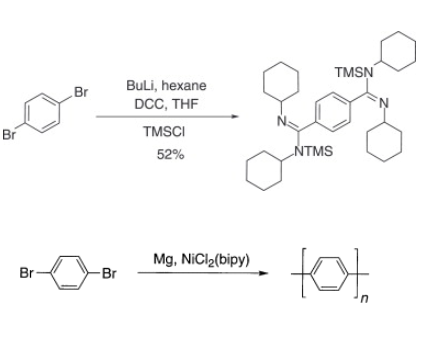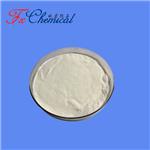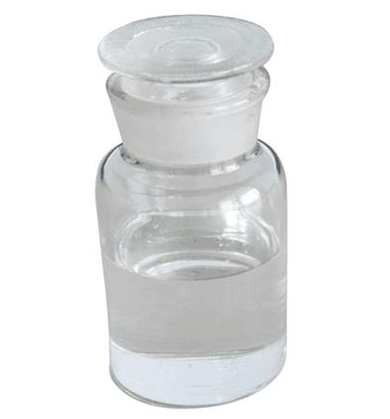1,4-Dibromobenzene: An Essential Compound in Organic Synthesis and Industrial Applications
Introduction
1,4-Dibromobenzene, also known as para-dibromobenzene, is a brominated derivative of benzene, represented by the chemical formula C6H4Br2. It is a white crystalline solid at room temperature, exhibiting a distinct aromatic odour. The molecular weight of this compound is 235.90 g/mol, and the melting point is 87-89 °C. 1,4-Dibromobenzene is sparingly soluble in water but readily dissolves in organic solvents such as ethanol, ether, and benzene.
Reaction profile
When 1,4-dibromobenzene is treated with 2 equiv of butyllithium, a double metal halogen exchange reaction occurs, and a subsequent reaction with two molecules of dicyclohexylcarbodiimide followed by silylation produces the silylated amidine.

The coupling of 1,4-dibromobenzene in the presence of magnesium and low-valent nickel promotors (NiCl2(bipy), bipy=2,2′-bipyridyl) results in the formation of slightly yellow PPP oligomers exhibiting an average of 10–15 aryl repeating units. Termination of the Grignard dehalogenating polycondensation may either be caused by modulation of the chemical reactivity of the end-groups or by increasing insolubility of the growing polymer chain, which eventually results in precipitation of the material from the solution.
Toxicity
1,4-Dibromobenzene (DBB) was administered to adult male Sprague-Dawley rats p.o. in corn oil. Groups of six rats were given 0, 5, 10, or 20 mg DBB/kg for 45 or 90 days. Rats were sacrificed 24 hours or 30 days after the last dose. No overt signs of toxicity were observed. The parameters measured were body weight gain, liver-to-body weight ratio, liver histopathology and hepatic microsomal enzyme activity. No gross or microscopic hepatic lesions were found. Liver to-body weight ratio and liver enzyme activity significantly increased at 20 mg/kg after 45 and 90 days. Both parameters were normal in the animals sacrificed 30 days later. A statistically significant increase in the activity of 1 of 6 microsomal enzymes was found at 10 mg/kg/day but was not accompanied by an increase in liver-to-body weight ratio.
References:
[1] GARY P. CARLSON R G T. Effect of 1,4-dibromobenzene and 1,2,4-tribromobenzene on xenobiotic metabolism[J]. Toxicology and applied pharmacology, 1977, 42 1: 1-233. DOI:10.1016/0041-008X(77)90209-5.[2] ANNAMARIA COLACCI . The covalent interaction of 1,4-dibromobenzene with rat and mouse nucleic acids: in vivo and in vitro studies[J]. Toxicology letters, 1990, 54 2: 121-362. DOI:10.1016/0378-4274(90)90174-K.
You may like
Lastest Price from 1,4-Dibromobenzene manufacturers

US $0.00/KG2025-04-21
- CAS:
- 106-37-6
- Min. Order:
- 1KG
- Purity:
- 98%min
- Supply Ability:
- 30tons/month
US $1.00/kg2025-04-21
- CAS:
- 106-37-6
- Min. Order:
- 1kg
- Purity:
- 99%
- Supply Ability:
- 10 mt


